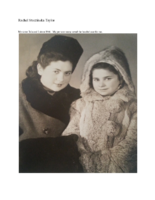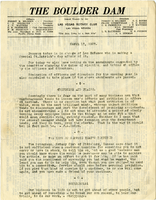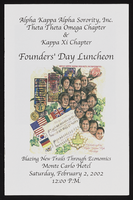Search the Special Collections and Archives Portal
Search Results

Congregation Ner Tamid Annual Report, 2006-2007
Date
Archival Collection
Description
2006-2007 annual report for Congregation Ner Tamid on the Greenspun Campus for Jewish life, learning, and spiritual renewal. The report includes statements, events, communities activities, statements, and photographs.
Mixed Content

Biographical essay by Rachel Taylor, 2014
Date
Archival Collection
Description
Rachel Taylor describes her family's experience during the Holocaust in Poland in the Kutno and Gubin ghettos. She was able to escape with her sisters and brother with the help of a Polish priest and nun, and her parents survived Auschwitz-Birkenau. Taylor came to the United Staes in 1961.
Text

"This Bud's for You": article draft by Roosevelt Fitzgerald
Date
Archival Collection
Description
From the Roosevelt Fitzgerald Professional Papers (MS-01082) -- Drafts for the Las Vegas Sentinel Voice file. The author's Mother's Day tribute to his mother, Miss Had.
Text

The Wheel Las Vegas Rotary Club newsletter, June 19, 1975
Date
Archival Collection
Description
Text

The Boulder Dam Las Vegas Rotary Club newsletter, March 17, 1927
Date
Archival Collection
Description
Text

Alpha Kappa Alpha Sorority, Theta Theta Omega Chapter Founders' Day committee reports
Date
Archival Collection
Description
From the Alpha Kappa Alpha Sorority, Incorporated, Theta Theta Omega Chapter Records (MS-01014) -- Chapter records file.
Text

Francis Oh Allen-Palenske oral history interview: transcript
Date
Archival Collection
Description
Oral history interview with Francis Oh Allen-Palenske conducted by Stefani Evans on June 30, 2022 for Reflections: the Las Vegas Asian American and Pacific Islander Oral History Project. In this interview, Francis describes her childhood growing up in Lousiana with a white father and Korean mother. She recalls the family relocating to Reno, Nevada in 1983 where Francis obtained her bachelor's degree in political science from the University of Nevada, Reno in 1999. She describes serving as a staffer in Washington, D.C. for Representative Jim Gibbons (R-NV) before moving to Las Vegas, Nevada. She discusses her Korean mother, maternal grandmother, and maternal aunts as strong, smart, business-minded women. Throughout the interview, she discusses Korean traditions, celebrations, clothing, and foods, as well as Korean cosmetics and views about skin color.
Text
Sanchez, Tony F., III, 1966-
Tony F. Sanchez III was born in the Las Vegas’ Women’s Hospital. It was 1966 and the plot of land the hospital sat on near Eastern and Sahara streets was considered rural. It was on the desert of the east Las Vegas that young Tony would grow up, graduate from Valley High School, and then graduate from University of Nevada, Las Vegas.
Person
Rocha, Fernando, 1994-
Coming from Durango and Tijuana, Mexico, Fernando Rocha’s parents met in Los Angeles in the mid-90s. Working in the sheet metal industry, his father’s career would take them to Las Vegas during the boom of the early 2000s to the slot machine industry where they would establish their family in Sunrise Manor. Little did he know that his son would later become a corporate banker working alongside the same industry with Wells Fargo.
Person
Nina Lu oral history interview
Identifier
Abstract
Oral history interview with Nina Lu conducted by Jennifer Sui on November 17, 2021 for the Reflections: The Las Vegas Asian American and Pacific Islander Oral History Project. In this interview, Lu recalls her difficult immgration journey from China to Los Angeles, California, and later to Las Vegas, Nevada. She also discusses former jobs, starting her own business, and embracing her unique identity and cultural heritage.
Archival Collection
